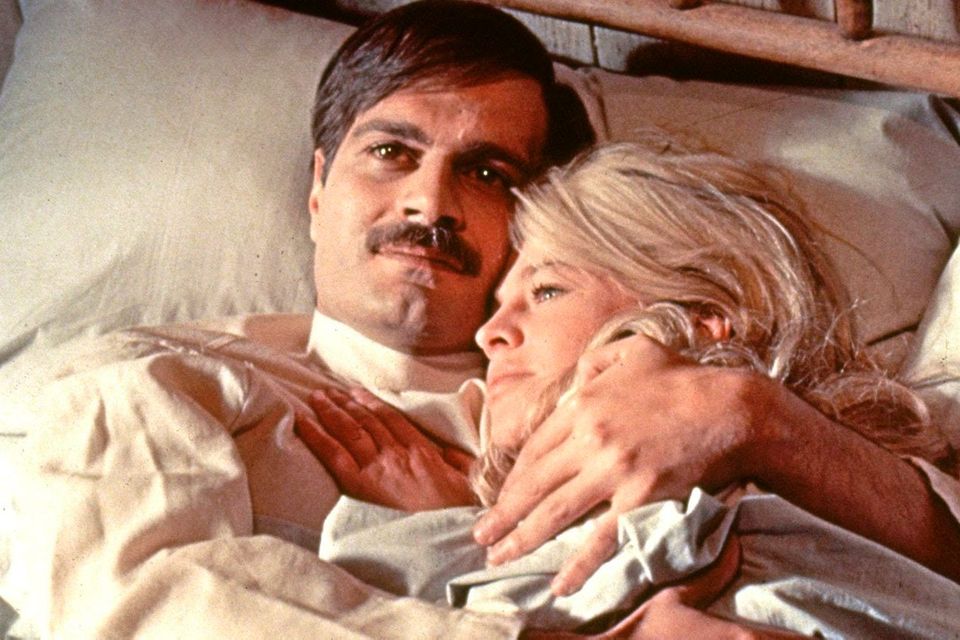Discovering the real Lara - and Herman Koch delivers a sermon
Non-fiction: Lara, Anna Pasternak, William Collins, €20
Omar Sharif and Julie Christie in the 1965 film version of Dr Zhivago
The brutality with which artistic genius is exterminated by dictators is well documented. Whether Hitler in Germany, Mao in China or Stalin in Russia, the writer and painter, the poet and musician are seen as a major threat to totalitarian regimes.
The autocrat recognises the artist's power to disseminate ideology through the simple medium of the page or canvas and that message has the power to inspire a nation. In Boris Pasternak's case, his novel Dr Zhivago had to be secretly published in 1956 to avoid expulsion to the Gulag. For Pasternak there was no question of exile - he never joined his family in Germany when they fled during the Revolution. Mother Russia was his true love, so much so that he was forced to decline the Nobel Prize in 1958 lest he be expelled.
Lara is written by his grand-niece and for the first time foregrounds the contribution made by his long-term love, Olga Ivinskaya, to his life. The book is a detailed examination through interviews and letters, and helpfully contextualises the revolutionary transition from Imperial Russia to its totalitarian state. Pasternak was prone to what the Soviet party labelled "bourgeois individualism" - their term for his 'romantic' and, to them, erroneous belief that human beings mattered. However, this book reveals both a selfish, egocentric poet and a genius whose destiny was dictated by his heart and soul.
Boris was with his second wife, Zinaida, when he met Olga in 1946. Olga had been widowed twice when they met; she was 34 and no stranger to tragedy. She was working at the literary magazine Novy Mir (New World) and was already a fan of Pasternak's poetry when he came into the office - from that moment their life-long love story began. He was 56.
The intensity of their affair was marred by the enormous price that Olga ended up paying for loving her 'Boria'. Pasternak never married his muse; he was supposedly saddled with guilt for already leaving two wives. Olga's lack of position made her a pawn in a political game. The Soviets could not be seen to harm Pasternak because of his international fame but due to her association with him, she was imprisoned twice in Siberian labour camps. The second time, her daughter Irina (Katenka in Dr Zhivago) was sent with her. Though not proven, Olga claimed that she miscarried her and Boris's child while imprisoned.
This book demonstrates that Olga was the woman who brought Pasternak joy, love and inspiration, but only the 'legally' married ex-wives enjoyed full protection. She was kept in a state of unofficial bigamy. Pasternak cohabited with his second wife and children in the "Big House" and dropped in on Olga in the "Little House" as the need for typing or sex took him. The arrangement leaves a somewhat bitter aftertaste on the poet's legacy.
David Lean made Doctor Zhivago into the epic film in 1965. It won five Oscars and launched Julie Christie as Lara and Omar Sharif as Yuri in a memorable love story based on Boris and Olga. The producer of Downton Abbey, Liz Trubridge, is currently developing the book for a six-part TV series. The actors who get to play Yuri and Lara have a lot to live up to, bringing this epic to a new generation.
Fiction: Dear Mr M, Herman Koch, Picador, €17.99
Hilary A White
Dutch author Herman Koch is no stranger to brattish feather-ruffling. The Dinner, his 2009 grand entrance, held an uneasy mirror up to his readership and picked holes in what he saw as the hypocrisy of adult life and bourgeois morals. It sold a million copies and was translated into 20 languages. It gave the former actor a platform from which to project about the life of a literary star, and these projections, fetid and cynical, form the buttressing for this elaborate diatribe.
The titular Mr M is a fading novelist in the Netherlands. He had a smash many years ago that he and his publishers have been chasing ever since. Payback told of an unpleasant love triangle exposed some years before the book's release. Mixed up in the scandal was a beautiful high school student, a teacher with whom she had a brief affair and a classmate who later became her boyfriend.
The bestseller was Mr M's take on a case that was never fully resolved in the judicial system. And now the public have accepted Payback as the verdict on the entire thing. People have been implicated for life because of the key-taps of a self-regarding fiction writer.
Koch has much to say about this idea of hubristic authorship and therefore good chunks take the form of an open letter from a stranger. This person stalking Mr M is out to discharge both barrels with an insidious level of threat that goes beyond pure hatemail. They live in the same apartment block and are completely up to speed on every aspect of M's life, including his pretty trophy wife. The calm, sour vigour with which Koch motors along during these verbal slashings is something to behold.
In the meantime, we are brought back to the actual events leading up to that news story that rocked the nation and its aftermath. In these unnecessarily protracted stretches of narrative, Koch shows us the perversions and dark distortions within each of the three characters. This truth is naturally neither pure nor simple.
All this is served up on a self-indulgent platter - one laden with rants about modern Europe, the weak Dutch resistance during WWII, immigration, gender politics and the slimy publishing industry. M is the mouthpiece, but it is Koch who seems desperate to be seen as the classroom messer. This is a cold and jaundiced outlook where the innocent are secretly vicious and those held up by society as men of wisdom are, once broken down, petty and self-serving.
The novel might not deliver "maturation" or "insight" because sometimes life itself cannot do this either. Dear Mr M takes a scenic route to this theory and is guilty of being too interested in such worthiness over the tale in hand. The sermon has devil in its detail. It is bold, provocative, regularly hilarious. But it is a sermon nonetheless.
Join the Irish Independent WhatsApp channel
Stay up to date with all the latest news















